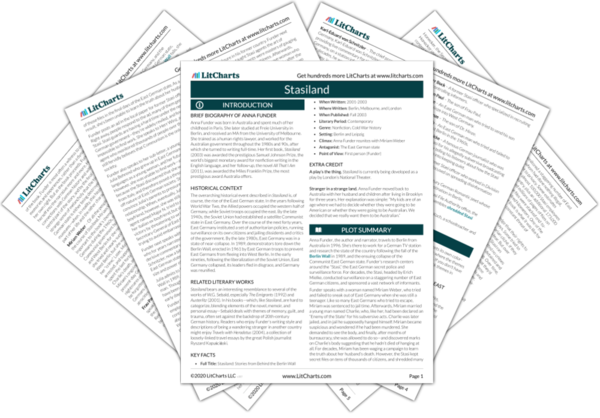Perhaps the most important aspect of the East German tyranny that Anna Funder explores in Stasiland is surveillance. Under the leadership of Erich Mielke, the Stasi monitored a staggering number of East German citizens, many of whom had done nothing illegal, violating these citizens’ right to privacy. Some estimates suggest that there used to be almost 100,000 Stasi employees running surveillance on the country, plus an additional 173,000 informers. The Stasi accumulated millions of pages of files on ordinary German people—if these files were stacked end-to-end, they’d stretch nearly two hundred kilometers. One of the key topics that Funder studies in her book is what it was like for millions of Germans to live under the constant threat of surveillance.
The East Germans reacted to the knowledge that their rights to privacy were being violated in numerous ways. Some tried to convince themselves that, as per the totalitarian cliché, if they had nothing to hide then they had nothing to fear. But over time, it became clear that this wasn’t true. The Stasi ran surveillance on millions of people who’d committed no crimes and done nothing wrong, and sometimes illegally detained and tortured suspects without any proof of wrongdoing. Over time, then, many East Germans came to accept the fact that they’d be monitored, no matter what they’d done. Many of these people went even further and informed on their friends and family in the hopes of protecting themselves from danger. (Funder doesn’t speak to many people who ratted out their loved ones to the Stasi, and it isn’t hard to understand why—most of those informers would be far too ashamed to discuss their betrayals with an Australian journalist.) As a result of the constant threat of surveillance and betrayal, both from the Stasi and from other civilians, some East Germans tried to escape from the country. Naturally, some succeeded while others failed, and were imprisoned or executed. But many more Germans had to live in a constant state of fear, uncertainty, and paranoia, knowing that they could be betrayed, arrested, and imprisoned at any time.
Stasi surveillance and the right to privacy are still topics of vigorous debate in Germany after the collapse of the East German state. Even though the Stasi themselves are no more, the millions of pages of surveillance files—some shredded, some not—are still around, creating a question of whether they should be destroyed permanently or reassembled and read. While it’s generally agreed that the Stasi had no right to run surveillance on German citizens, it’s also agreed that, now that the surveillance records exist, people have a right to read through their own personal files in private. Funder further objects to the slow pace at which the government is reassembling the files: at the current rate, most East Germans will be dead by the time they receive their files. The fact that, after the fall of the Berlin Wall, people are still arguing, fighting, and weeping over Stasi surveillance shows that the Stasi’s immoral violations of the right to privacy will continue to hurt people for years to come. But perhaps by gaining access to their personal files, Funder cautiously suggests, people could fully grasp the evils of the East German government, and fight to prevent such a government from coming into existence ever again.
Surveillance and Privacy ThemeTracker

Surveillance and Privacy Quotes in Stasiland
On the eleventh night, Miriam gave them what they wanted. ‘I thought, “You people want an underground escape organization? Well, I'll give you one then.”’
Fleischer had won.
The German media called East Germany ‘the most perfected surveillance state of all time’. At the end, the Stasi had 97,000 employees—more than enough to oversee a country of seventeen million people.
It was a close call, but Germany was the only Eastern Bloc country in the end that so bravely, so conscientiously, opened its files on its people to its people.
Whenever he stayed with her, the surveillance was intense and overt.
The couple could hardly leave the house without being stopped by the police and asked to account for themselves.
Julia doesn't know why the Stasi was afraid of them complaining to Honecker. Possibly because both her parents were teachers, and outwardly conformist, or because the Stasi had no ‘legal’ basis for what it had done to her. Who knows? It is one of the very rare occasions when the bluff was called and someone ‘won’ against the Firm.
‘The amazing thing was,’ Julia says, ‘the next week I was rung up about a job.’ She was taken on as a receptionist in a hotel. It looked like she would work there for her lifetime.
The Stasi subjected him to disciplinary proceedings on account of ‘inconstancy’, and in their files attributed the remarriage to ‘the repeated negative influence of Frau Koch’.
He is telling me, in his quiet way, that the resources united Germany is throwing at this part of reconstructing the lives of its former East German citizens are pitiful, some kind of Sisyphean joke. What he is running here is an almost totally symbolic act.
I have been sown
Only my head sticks
Defiant, out of the earth
But one day it too will be mown
Making me, finally
Of this land.











